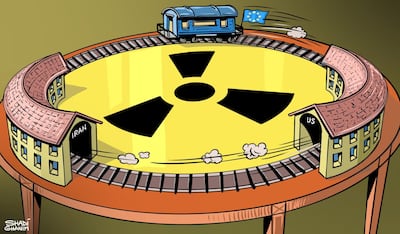A rapid nuclear deal with Iran is “farther away than before” with the country waiting for its new president to settle in before entering serious talks, a leading academic has told The National.
An agreement is now highly unlikely until after August when President Ebrahim Raisi’s new team takes office.
Dr Anish Tabrizi said it was possible that Tehran’s leadership had decided to wait for Mr Raisi’s incoming administration to allow them to take credit for a deal which would inevitably include the lifting of many US sanctions.
But the Iran expert from the Royal United Services Institute think tank said the chances of rapidly reining in Iran’s advances in building a nuclear bomb with a new deal were diminishing.
“We're farther away from a deal than we were before the Iranian elections,” she told The National. “They're already indicating that the ball will be with the new administration so that means that we'll have to wait not only for the new hardline team to be in place but also for clarification on what their conditions are. That means a much longer waiting time.”

In the meantime, Iran is ramping up its nuclear research programme, probably to give it a stronger bargaining hand.
There are growing concerns that Tehran might be able to build a bomb within months if it opts for major acceleration rather than the year-long period envisaged when the Joint Comprehensive Plan of Action deal was struck in 2015.
The “maximum pressure” sanctions introduced by former US president Donald Trump, who withdrew from the accord in 2018, led to Iran breaching the agreement. It has now accumulated an estimated 3,000 kilograms of 5 per cent-enriched uranium, enough to make a number of bombs if enriched further, the International Atomic Energy Agency say.
The more knowledge Iran gains, “the more difficult it becomes to ensure that the JCPoA can be the same bulwark against nuclear weapons development as it was in 2015”, said Kelsey Davenport, director for non-proliferation at the Arms Control Association. “It’s a dangerous game. Iran is putting the Vienna talks at risk by pursuing nuclear activities that cannot be fully reversed.”
The negotiations, held in Vienna and involving diplomats from Britain, China, France, Germany, Russia and the EU, are set to enter a seventh round but potentially not until sometime in August or later.
Even without the hardline Raisi regime taking office, American officials complained that they have “serious differences” on the measures Iran needs to be nuclear compliant, what sanctions might be lifted and in what order.
Tehran is eager for the sanctions to be lifted, particularly for the billions in foreign currency earned through the legal sale of oil, but it has managed to weather the US-imposed restrictions for the past three years.
Even if the US and Iran do agree to revive the nuclear agreement, there is a growing requirement for an all-encompassing security deal for the Middle East. Iran’s advancing ballistic missile programme and its sponsorship of Iraqi militias and Hezbollah undermines stability in the region.
America wants a deeper deal but Mr Raisi says those issues are “non-negotiable”.
“The best-case scenario will be something on the nuclear agreement then moving into something regional, but that is going to be much more complicated because you are starting from zero,” Dr Tabrizi said.


